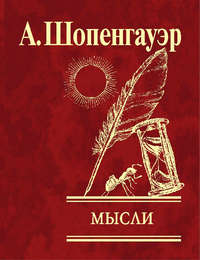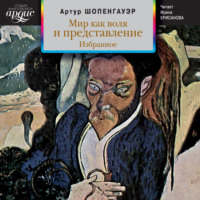 полная версия
полная версияThe World as Will and Idea (Vol. 3 of 3)
After this exposition of rhythm, I have now to show how the nature of melody consists in the constantly renewed disunion and reconciliation of the rhythmical, and the harmonious elements of it. Its harmonious element has as its assumption the fundamental note, as the rhythmical element has the species of time, and consists in a wandering from it through all the notes of the scale, until by shorter or longer digressions it reaches a harmonious interval, generally the dominant or sub-dominant, which affords it an incomplete satisfaction; and then follows, by a similarly long path, its return to the fundamental note, with which complete satisfaction appears. But both must so take place that the attainment of the interval referred to and the return to the fundamental note correspond with certain favourite points of the rhythm, otherwise it will not work. Thus, as the harmonious succession of sounds requires certain notes, first of all the tonic, next to it the dominant, and so on, so rhythm, on its part, requires certain points of time, certain numbered bars, and certain parts of these bars, which are called strong or good beats, or the accented parts of the bar, in opposition to the weak or bad beats, or unaccented parts of the bar. Now the disunion of these two fundamental elements consists in this, that because the demand of one is satisfied that of the other is not; and their reconciliation consists in this, that both are satisfied at once and together. That wandering of the notes until they find a more or less harmonious interval must so take place that this interval is attained only after a definite number of bars, and also at an accented part of the bar, and in this way becomes for it a kind of resting-point; and similarly the return to the keynote must take place after a like number of bars, and also at an accented part of the bar, and thus complete satisfaction is then attained. So long as this required coincidence of the satisfaction of both elements is not attained, the rhythm, on the one hand, may follow its regular course, and, on the other hand, the required notes may occur often enough, but yet they will remain entirely without that effect through which melody arises. The following very simple example may serve to illustrate this: —
Here the harmonious sequence of notes finds the keynote just at the end of the first bar; but it does not receive any satisfaction from this, because the rhythm is caught at the least accented part of the bar. Immediately afterwards, in the second bar, the rhythm has the accented part of the bar, but the sequence of notes has arrived at the seventh. Thus here the two elements of melody are entirely disunited; and we feel disquieted. In the second half of the period everything is reversed, and in the last note they are reconciled. This kind of thing can be shown in every melody, although generally in a much more extended form. Now the constant disunion and reconciliation of its two elements which there takes place is, when metaphysically considered, the copy of the origination of new wishes, and then of their satisfaction. Thus, by flattery, music penetrates into our hearts, for it presents the image of the complete satisfaction of its wishes. More closely considered, we see in this procedure of melody a condition which, to a certain extent, is inward (the harmonious) meet with an outward condition (the rhythmical), as if by an accident, – which is certainly brought about by the composer, and which may, so far, be compared to rhyme in poetry. But this is just the copy of the meeting of our wishes with the favourable outward circumstances which are independent of them, and is thus the picture of happiness. The effect of the suspension also deserves to be considered here. It is a dissonance which delays the final consonance, which is awaited with certainty; and thus the longing for it is strengthened, and its appearance satisfies all the more. Clearly an analogue of the heightened satisfaction of the will through delay. The complete cadence requires the preceding chord of the seventh on the dominant; because the most deeply felt satisfaction and the most entire relief can only follow the most earnest longing. Thus, in general, music consists of a constant succession of more or less disquieting chords, i. e., chords which excite longing, and more or less quieting and satisfying chords; just as the life of the heart (the will) is a constant succession of greater or less disquietude through desire and aversion, and just as various degrees of relief. Accordingly the harmonious sequence of chords consists of the correct alternation of dissonance and consonance. A succession of merely consonant chords would be satiating, wearisome, and empty, like the languor produced by the satisfaction of all wishes. Therefore dissonances must be introduced, although they disquiet us and affect us almost painfully, but only in order to be resolved again in consonances with proper preparation. Indeed, in the whole of music there are really only two fundamental chords, the dissonant chord of the seventh and the consonant triad, to which all chords that occur can be referred. This just corresponds to the fact, that for the will there are at bottom only dissatisfaction and satisfaction, under however many forms they may present themselves. And as there are two general fundamental moods of the mind, serenity, or at least healthiness, and sadness, or even oppression, so music has two general keys, the major and the minor, which correspond to these, and it must always be in one of the two. But it is, in fact, very wonderful that there is a sign of pain which is neither physically painful nor yet conventional, but which nevertheless is suitable and unmistakable: the minor. From this we may measure how deeply music is founded in the nature of things and of man. With northern nations, whose life is subject to hard conditions, especially with the Russians, the minor prevails, even in the church music. Allegro in the minor is very common in French music, and is characteristic of it; it is as if one danced while one's shoe pinched.
I add further a few subsidiary remarks. When the key-note is changed, and with it the value of all the intervals, in consequence of which the same note figures as the second, the third, the fourth, and so on, the notes of the scale are analogous to actors, who must assume now one rôle, now another, while their person remains the same. That the actors are often not precisely suited to these rôles may be compared to the unavoidable impurity of every harmonic system (referred to at the end of § 52 of the first volume) which the equal temperament has introduced.
Perhaps some may be offended, that, according to this metaphysic of it, music, which so often exalts our minds, which seems to us to speak of other and better worlds than ours, yet really only flatters the will to live, because it exhibits to it its nature, deludes it with the image of its success, and at the end expresses its satisfaction and contentment. The following passage from the “Vedas” may serve to quiet such doubts: “Etanand sroup, quod forma gaudii est, τον pram Atma ex hoc dicunt, quod quocunque loco gaudium est, particula e gaudio ejus est” (Oupnekhat, vol. i. p. 405; et iterum, vol. ii. p. 215).
Supplements to the Fourth Book
“Tous les hommes désirent uniquement de se délivrer de la mort: ils ne savent pas se délivrer de la vie.”
– Lao-tsen-Tao-te-King, ed. Stan. Julien, p. 184.Chapter XL. Preface
The supplements to this fourth book would be very considerable if it were not that two of its principal subjects which stand specially in need of being supplemented – the freedom of the will and the foundation of ethics – have, on the occasion of prize questions being set by two Scandinavian Academies, been fully worked out by me in the form of a monograph, which was laid before the public in the year 1841 under the title, “The Two Fundamental Problems of Ethics.” Accordingly I assume an acquaintance on the part of my readers with the work which has just been mentioned, just as unconditionally as in the supplements to the second book I have assumed it with regard to the work “On the Will in Nature.” In general I make the demand that whoever wishes to make himself acquainted with my philosophy shall read every line of me. For I am no voluminous writer, no fabricator of compendiums, no earner of pecuniary rewards, not one whose writings aim at the approbation of a minister; in a word, not one whose pen is under the influence of personal ends. I strive after nothing but the truth, and write as the ancients wrote, with the sole intention of preserving my thoughts, so that they may be for the benefit of those who understand how to meditate upon them and prize them. Therefore I have written little, but that little with reflection and at long intervals, and accordingly I have also confined within the smallest possible limits those repetitions which in philosophical works are sometimes unavoidable on account of the connection, and from which no single philosopher is free; so that by far the most of what I have to say is only to be found in one place. On this account, then, whoever wishes to learn from me and understand me must leave nothing unread that I have written. Yet one can judge me and criticise me without this, as experience has shown; and to this also I further wish much pleasure.
Meanwhile the space gained by the said elimination of two important subjects will be very welcome to us. For since those explanations, which every man has more at heart than anything else, and which therefore in every system, as ultimate results, form the apex of its pyramid, are also crowded together in my last book, a larger space will gladly be granted to every firmer proof or more accurate account of these. Besides this we have been able to discuss here, as belonging to the doctrine of the “assertion of the will to live,” a question which in our fourth book itself remained untouched, as it was also entirely neglected by all philosophers before me: it is the inner significance and real nature of the sexual love, which sometimes rises to a vehement passion – a subject which it would not have been paradoxical to take up in the ethical part of philosophy if its importance had been known.
Chapter XLI.27 On Death And Its Relation To The Indestructibility Of Our True Nature
Death is the true inspiring genius, or the muse of philosophy, wherefore Socrates has defined the latter as θανατου μελετη. Indeed without death men would scarcely philosophise. Therefore it will be quite in order that a special consideration of this should have its place here at the beginning of the last, most serious, and most important of our books.
The brute lives without a proper knowledge of death; therefore the individual brute enjoys directly the absolute imperishableness of the species, for it is only conscious of itself as endless. In the case of men the terrifying certainty of death necessarily entered with reason. But as everywhere in nature with every evil a means of cure, or at least some compensation, is given, the same reflection which introduces the knowledge of death also assists us to metaphysical points of view, which comfort us concerning it, and of which the brute has no need and is incapable. All religious and philosophical systems are principally directed to this end, and are thus primarily the antidote to the certainty of death, which the reflective reason produces out of its own means. Yet the degree in which they attain this end is very different, and certainly one religion or philosophy will, far more than the others, enable men to look death in the face with a quiet glance. Brahmanism and Buddhism, which teach man to regard himself as himself, the original being, the Brahm, to which all coming into being and passing away is essentially foreign, will achieve much more in this respect than such as teach that man is made out of nothing, and actually begins at birth his existence derived from another. Answering to this we find in India a confidence and a contempt for death of which one has no conception in Europe. It is, in fact, a hazardous thing to force upon a man, by early imprinting them, weak and untenable conceptions in this important regard, and thereby making him for ever incapable of taking up correct and stable ones. For example, to teach him that he recently came out of nothing, and consequently through an eternity has been nothing, but yet for the future will be imperishable, is just the same as to teach him that although he is through and through the work of another, yet he will be held responsible through all eternity for his actions. If, then, when the mind ripens and reflection appears, the untenable nature of such doctrines forces itself upon him, he has nothing better to put in its place, nay, is no longer capable of understanding anything better, and thus loses the comfort which nature had destined for him also, as a compensation for the certainty of death. In consequence of such a process, we see even now in England (1844), among ruined factory hands, the Socialists, and in Germany, among ruined students, the young Hegelians, sink to the absolutely physical point of view, which leads to the result: edite, bibite, post mortem nulla voluptas, and so far may be defined as bestialism.
However, after all that has been taught concerning death, it cannot be denied that, at least in Europe, the opinion of men, nay, often even of the same individual, very frequently vacillates between the conception of death as absolute annihilation and the assumption that we are, as it were, with skin and hair, immortal. Both are equally false: but we have not so much to find a correct mean as rather to gain the higher point of view from which such notions disappear of themselves.
In these considerations I shall first of all start from the purely empirical standpoint. Here there primarily lies before us the undeniable fact that, according to the natural consciousness, man not only fears death for his own person more than anything else, but also weeps violently over the death of those that belong to him, and indeed clearly not egotistically, for his own loss, but out of sympathy for the great misfortune that has befallen them. Therefore he also censures those who in such a case neither weep nor show sadness as hard-hearted and unloving. It is parallel with this that revenge, in its highest degree, seeks the death of the adversary as the greatest evil that can be inflicted. Opinions change with time and place; but the voice of nature remains always and everywhere the same, and is therefore to be heeded before everything else. Now here it seems distinctly to say that death is a great evil. In the language of nature death means annihilation. And that death is a serious matter may be concluded from the fact that, as every one knows, life is no joke. We must indeed deserve nothing better than these two.
In fact, the fear of death is independent of all knowledge; for the brute has it, although it does not know death. Everything that is born brings it with it into the world. But this fear of death is a priori only the reverse side of the will to live, which indeed we all are. Therefore in every brute the fear of its destruction is inborn, like the care for its maintenance. Thus it is the fear of death, and not the mere avoidance of pain, which shows itself in the anxious carefulness with which the brute seeks to protect itself, and still more its brood, from everything that might become dangerous. Why does the brute flee, trembling, and seek to conceal itself? Because it is simply the will to live, but, as such, is forfeited to death, and wishes to gain time. Such also, by nature, is man. The greatest evil, the worst that can anywhere threaten, is death; the greatest fear is the fear of death. Nothing excites us so irresistibly to the most lively interest as danger to the life of others; nothing is so shocking as an execution. Now the boundless attachment to life which appears here cannot have sprung from knowledge and reflection; to these it rather appears foolish, for the objective worth of life is very uncertain, and at least it remains doubtful whether it is preferable to not being, nay, if experience and reflection come to be expressed, not being must certainly win. If one knocked on the graves, and asked the dead whether they wished to rise again, they would shake their heads. Such is the opinion of Socrates in “Plato's Apology,” and even the gay and amiable Voltaire cannot help saying, “On aime la vie; mais le néant ne laisse pas d'avoir du bon;” and again, “Je ne sais pas ce que c'est que la vie éternelle, mais celle-ci est une mauvaise plaisanterie.” Besides, life must in any case soon end; so that the few years which perhaps one has yet to be vanish entirely before the endless time when one will be no more. Accordingly it appears to reflection even ludicrous to be so anxious about this span of time, to tremble so much if our own life or that of another is in danger, and to compose tragedies the horror of which has its strength in the fear of death. That powerful attachment to life is therefore irrational and blind; it can only be explained from the fact that our whole inner nature is itself will to live, to which, therefore, life must appear as the highest good, however embittered, short, and uncertain it may always be; and that that will, in itself and originally, is unconscious and blind. Knowledge, on the contrary, far from being the source of that attachment to life, even works against it, for it discloses the worthlessness of life, and thus combats the fear of death. When it conquers, and accordingly the man faces death courageously and composedly, this is honoured as great and noble, thus we hail then the triumph of knowledge over the blind will to live, which is yet the kernel of our own being. In the same way we despise him in whom knowledge is defeated in that conflict, and who therefore clings unconditionally to life, struggles to the utmost against approaching death, and receives it with despair;28 and yet in him it is only the most original being of ourselves and of nature that expresses itself. We may here ask, in passing, how could this boundless love of life and endeavour to maintain it in every way as long as possible be regarded as base, contemptible, and by the adherents of every religion as unworthy of this, if it were the gift of good gods, to be recognised with thankfulness? And how could it then seem great and noble to esteem it lightly? Meanwhile, what is confirmed by these considerations is – (1.) that the will to live is the inmost nature of man; (2.) that in itself it is unconscious and blind; (3.) that knowledge is an adventitious principle, which is originally foreign to the will; (4.) that knowledge conflicts with the will, and that our judgment applauds the victory of knowledge over the will.
If what makes death seem so terrible to us were the thought of not being, we would necessarily think with equal horror of the time when as yet we were not. For it is irrefutably certain that not being after death cannot be different from not being before birth, and consequently is also no more deplorable. A whole eternity has run its course while as yet we were not, but that by no means disturbs us. On the other hand, we find it hard, nay, unendurable, that after the momentary intermezzo of an ephemeral existence, a second eternity should follow in which we shall no longer be. Should, then, this thirst for existence have arisen because we have now tasted it and have found it so delightful? As was already briefly explained above, certainly not; far sooner could the experience gained have awakened an infinite longing for the lost paradise of non-existence. To the hope, also, of the immortality of the soul there is always added that of a “better world” – a sign that the present world is not much good. Notwithstanding all this, the question as to our state after death has certainly been discussed, in books and verbally, ten thousand times oftener than the question as to our state before birth. Yet theoretically the one is just as near at hand and as fair a problem as the other; and besides, whoever had answered the one would soon see to the bottom of the other. We have fine declamations about how shocking it would be to think that the mind of man, which embraces the world, and has so many very excellent thoughts, should sink with him into the grave; but we hear nothing about this mind having allowed a whole eternity to pass before it came into being with these its qualities, and how the world must have had to do without it all that time. Yet no question presents itself more naturally to knowledge, uncorrupted by the will, than this: An infinite time has passed before my birth; what was I during this time? Metaphysically, it might perhaps be answered, “I was always I; that is, all who during that time said I, were just I.” But let us look away from this to our present entirely empirical point of view, and assume that I did not exist at all. Then I can console myself as to the infinite time after my death, when I shall not be, with the infinite time when I already was not, as a well-accustomed, and indeed very comfortable, state. For the eternity a parte post without me can be just as little fearful as the eternity a parte ante without me, since the two are distinguished by nothing except by the interposition of an ephemeral dream of life. All proofs, also, for continued existence after death may just as well be applied in partem ante, where they then demonstrate existence before life, in the assumption of which the Hindus and Buddhists therefore show themselves very consistent. Kant's ideality of time alone solves all these riddles. But we are not speaking of that now. This, however, results from what has been said, that to mourn for the time when one will be no more is just as absurd as it would be to mourn over the time when as yet one was not; for it is all the same whether the time which our existence does not fill is related to that which it does fill, as future or as past.
But, also, regarded entirely apart from these temporal considerations, it is in and for itself absurd to look upon not being as an evil; for every evil, as every good, presupposes existence, nay, even consciousness: but the latter ceases with life, as also in sleep and in a swoon; therefore the absence of it is well known to us, and trusted, as containing no evil at all: its entrance, however, is always an affair of a moment. From this point of view Epicurus considered death, and therefore quite rightly said, “ὁ θανατος μηδεν προς ἡμας” (Death does not concern us); with the explanation that when we are death is not, and when death is we are not (Diog. Laert., x. 27). To have lost what cannot be missed is clearly no evil. Therefore ceasing to be ought to disturb us as little as not having been. Accordingly from the standpoint of knowledge there appears absolutely no reason to fear death. But consciousness consists in knowing; therefore, for consciousness death is no evil. Moreover, it is really not this knowing part of our ego that fears death, but the fuga mortis proceeds entirely and alone from the blind will, of which everything living is filled. To this, however, as was already mentioned above, it is essential, just because it is will to live, whose whole nature consists in the effort after life and existence, and which is not originally endowed with knowledge, but only in consequence of its objectification in animal individuals. If now the will, by means of knowledge, beholds death as the end of the phenomenon with which it has identified itself, and to which, therefore, it sees itself limited, its whole nature struggles against it with all its might. Whether now it has really something to fear from death we will investigate further on, and will then remember the real source of the fear of death, which has been shown here along with the requisite distinction of the willing and the knowing part of our nature.
Corresponding to this, then, what makes death so terrible to us is not so much the end of life – for this can appear to no one specially worthy of regret – but rather the destruction of the organism; really because this is the will itself exhibiting itself as body. But we only really feel this destruction in the evils of disease or of old age; death itself, on the other hand, consists for the subject only in the moment when consciousness vanishes because the activity of the brain ceases. The extension of the stoppage to all the other parts of the organism which follows this is really already an event after death. Thus death, in a subjective regard, concerns the consciousness alone. Now what the vanishing of this may be every one can to a certain extent judge of from going to sleep; but it is still better known to whoever has really fainted, for in this the transition is not so gradual, nor accompanied by dreams, but first the power of sight leaves us, still fully conscious, and then immediately the most profound unconsciousness enters; the sensation that accompanies it, so far as it goes, is anything but disagreeable; and without doubt, as sleep is the brother of death, so the swoon is its twin-brother. Even violent death cannot be painful, for even severe wounds are not felt at all till some time afterwards, often not till the outward signs of them are observed. If they are rapidly mortal, consciousness will vanish before this discovery; if they result in death later, then it is the same as with other illnesses. All those also who have lost consciousness in water, or from charcoal fumes, or through hanging are well known to say that it happened without pain. And now, finally, the death which is properly in accordance with nature, death from old age, euthanasia, is a gradual vanishing and sinking out of existence in an imperceptible manner. Little by little in old age, the passions and desires, with the susceptibility for their objects, are extinguished; the emotions no longer find anything to excite them; for the power of presenting ideas to the mind always becomes weaker, its images fainter; the impressions no longer cleave to us, but pass over without leaving a trace, the days roll ever faster, events lose their significance, everything grows pale. The old man stricken in years totters about or rests in a corner now only a shadow, a ghost of his former self. What remains there for death to destroy? One day a sleep is his last, and his dreams are – . They are the dreams which Hamlet inquires after in the famous soliloquy. I believe we dream them even now.











